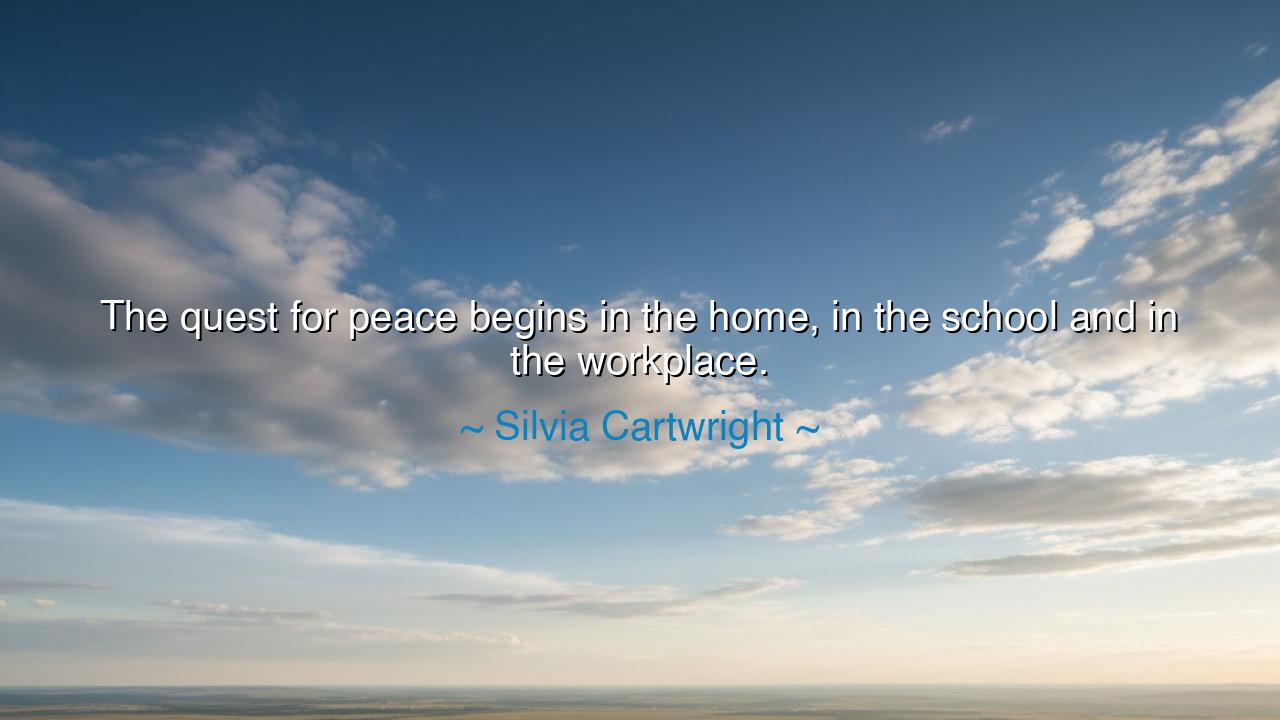
The quest for peace begins in the home, in the school and in the






Hear these words, O seekers of wisdom, spoken by Silvia Cartwright: “The quest for peace begins in the home, in the school and in the workplace.” This saying is no idle reflection, but a commandment for the ages, a truth rooted in the soil of human life. For peace does not descend upon nations like a sudden storm of light; it must first be cultivated in the smallest circles where human souls meet and contend. The throne of kings and the treaties of rulers may shout of peace, but if the household is filled with strife, if the classroom burns with cruelty, if the workplace festers with injustice—then such peace is but smoke without fire.
Consider first the home, the cradle of all being. If love does not dwell within the walls of family, how can it dwell in the city or the state? A child who grows in a house of violence learns violence as his native tongue; a child who grows in kindness learns kindness as breath. Thus the home becomes the seedbed of peace or the forge of hatred. To ignore the hearth is to wage war against the very foundation of humanity.
Next, behold the school, the temple where minds are shaped. There, the young are taught not only numbers and words, but the laws of dignity, of respect, of harmony with others. Where schools sow division, contempt, and neglect, societies reap rebellion, bitterness, and discord. Where schools nurture curiosity, justice, and compassion, nations grow wise and strong. The voice of Cartwright reminds us: the peace of tomorrow is written today in the lessons whispered in classrooms.
Then turn to the workplace, where men and women labor side by side. How many hours of life are spent in toil! If bitterness reigns there, if cruelty, exploitation, and envy govern, then no treaties nor sermons can preserve harmony. But when workplaces are filled with fairness, cooperation, and respect, they become sanctuaries where the dignity of labor becomes a song of peace. For peace is not only the silence of guns; it is the presence of justice in the daily bread we earn together.
Reflect on the story of Mahatma Gandhi, who showed that peace is born not from lofty palaces but from the humblest of places. Gandhi spun his wheel at home, taught simplicity and equality in schools, and demanded justice in the workplace. By transforming these simple spheres, he shook the greatest empire of his age. His life cries aloud the truth of Cartwright’s words: peace begins not in distant halls of power, but where ordinary lives are lived each day.
And yet, O children of time, this quest is not an easy road. For it requires each man and woman to look within and govern themselves. To speak gently at the table, to encourage instead of scorn in the classroom, to honor rather than exploit in the workplace—these are the quiet battles that win the greater war for peace. Nations collapse because hearts collapse; nations rise because hearts are lifted.
Therefore, take this teaching as a lamp for your path: if you would see peace in the world, be peace in your home, your school, your work. Speak truth without cruelty. Show patience without weakness. Honor the dignity of all, whether kin, classmate, or colleague. For the peace that begins in these small places does not end there—it flows outward, like ripples in water, until it touches the furthest shore.
So, let your actions be as seeds: in the home, sow love; in the school, sow wisdom; in the workplace, sow justice. Thus shall the fields of humanity bear the harvest of peace, and your life itself become a testament to the eternal truth of Silvia Cartwright’s words.






AAdministratorAdministrator
Welcome, honored guests. Please leave a comment, we will respond soon